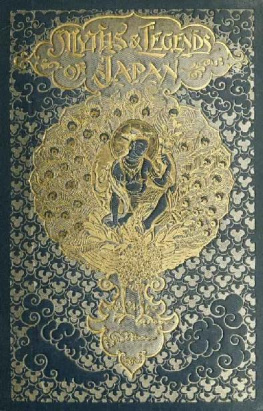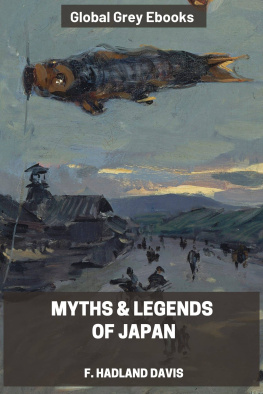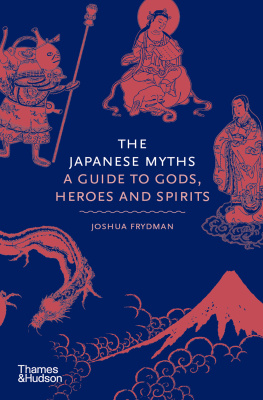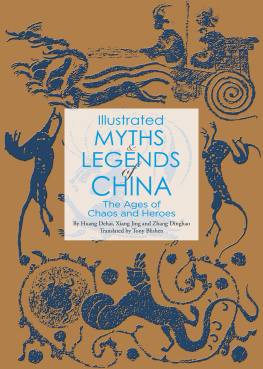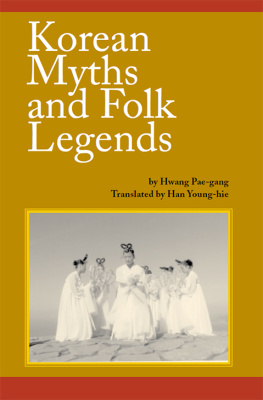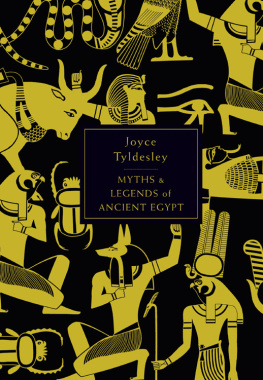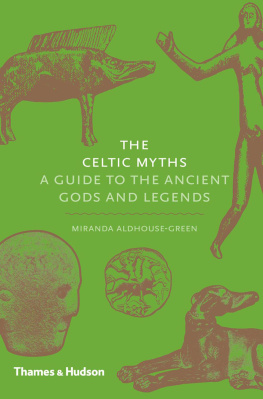The Project Gutenberg eBook, Myths & Legends of Japan, by F. Hadland (Frederick Hadland) Davis, Illustrated by Evelyn Paul
This eBook is for the use of anyone anywhere at no cost and with almost no restrictions whatsoever. You may copy it, give it away or re-use it under the terms of the Project Gutenberg License included with this eBook or online at www.gutenberg.org
Title: Myths & Legends of Japan
Author: F. Hadland (Frederick Hadland) Davis
Release Date: May 23, 2014 [eBook #45723]
Language: English
Character set encoding: UTF-8
***START OF THE PROJECT GUTENBERG EBOOK MYTHS & LEGENDS OF JAPAN***
E-text prepared by Madelaine Kilsby and Marc D'Hooghe
(http://www.freeliterature.org)
from page images generously made available by
Internet Archive
(https://archive.org)
| Note: | Images of the original pages are available through Internet Archive. See https://archive.org/details/mythslegendsofja00davi |
MYTHS & LEGENDS OF JAPAN
BY
F. HADLAND DAVIS
AUTHOR OF "THE LAND OF THE YELLOW SPRING AND OTHER
JAPANESE STORIES" "THE PERSIAN MYSTICS" ETC.
WITH THIRTY-TWO FULL-PAGE ILLUSTRATIONS
BY
EVELYN PAUL
LONDON
GEORGE G. HARRAP & COMPANY
9, PORTSMOUTH STREET, KINGSWAY, W. C.
1912

The Lovers who exchanged Fans. Fr. (See page 245)
DEDICATED TO
MY WIFE
PREFACE
In writing Myths and Legends of Japan I have been much indebted to numerous authorities on Japanese subjects, and most especially to Lafcadio Hearn, who first revealed to me the Land of the Gods. It is impossible to enumerate all the writers who have assisted me in preparing this volume. I have borrowed from their work as persistently as Japan has borrowed from other countries, and I sincerely hope that, like Japan herself, I have made good use of the material I have obtained from so many sources.
I am indebted to Professor Basil Hall Chamberlain for placing his work at my disposal, and I have found his encyclopdic volume, Things Japanese, his translation of the Kojiki, his Murray's Hand-book for Japan (in collaboration with W. B. Mason), and his Japanese Poetry, of great value. I thank the Executors of the late Dr. W. G. Aston for permission to quote from this learned authority's work. I have made use of his translation of the Nihongi (Transactions of the Japan Society, 1896) and have gathered much useful material from A History of Japanese Literature. I am indebted to Mr. F. Victor Dickins for allowing me to make use of his translation of the Taketori Monogatari and the Ho-j-ki. My friend Mrs. C. M. Salwey has taken a sympathetic interest in my work, which has been invaluable to me. Her book, Fans of Japan, has supplied me with an exquisite legend, and many of her articles have yielded a rich harvest. I warmly thank Mr. Yone Noguchi for allowing me to quote from his poetry, and also Miss Clara A. Walsh for so kindly putting at my disposal her fascinating volume, The Master-Singers of Japan, published by Mr. John Murray in the "Wisdom of the East" series. My thanks are due to Messrs. Houghton, Mifflin Company, for allowing me to quote from Lafcadio Hearn's Glimpses of Unfamiliar Japan and The Japanese Letters of Lafcadio Hearn; to Messrs. George Allen & Sons, for giving me permission to quote from Sir F. T. Piggott's Garden of Japan; to the Editor of the Academy, for permitting me to reprint my article on "Japanese Poetry," and to Messrs. Cassell and Co. Ltd., for allowing me to reproduce "The Garden of Japan," which I originally contributed to Cassell's Magazine. The works of Dr. William Anderson, Sir Ernest Satow, Lord Redesdale, Madame Ozaki, Mr. R. Gordon Smith, Captain F. Brinkley, the late Rev. Arthur Lloyd, Mr. Henri L. Joly, Mr. K. Okakura, the Rev. W. E. Griffis, and others, have been of immense value to me, and in addition I very warmly thank all those writers I have left unnamed, through want of space, whose works have assisted me in the preparation of this volume.
CONTENTS
Introduction
| I. |
| II. |
| III. |
| IV. |
| V. |
| VI. |
| VII. |
| VIII. |
| IX. |
| X. |
| XI. |
| XII. |
| XIII. |
| XIV. |
| XV. |
| XVI. |
| XVII. |
| XVIII. |
| XIX. |
| XX. |
| XXI. |
| XXII. |
| XXIII. |
| XXIV. |
| XXV. |
| XXVI. |
| XXVII. |
| XXVIII. |
| XXIX. |
| XXX. |
|
| XXXI. |
LIST OF ILLUSTRATIONS
Frontispiece
INTRODUCTION
Pierre Loti in Madame Chrysanthme, Gilbert and Sullivan in The Mikado, and Sir Edwin Arnold in Seas and Lands, gave us the impression that Japan was a real fairyland in the Far East. We were delighted with the prettiness and quaintness of that country, and still more with the prettiness and quaintness of the Japanese people. We laughed at their topsy-turvy ways, regarded the Japanese woman, in her rich-coloured kimono, as altogether charming and fascinating, and had a vague notion that the principal features of Nippon were the tea-houses, cherry-blossom, and geisha. Twenty years ago we did not take Japan very seriously. We still listen to the melodious music of The Mikado, but now we no longer regard Japan as a sort of glorified willow-pattern plate. The Land of the Rising Sun has become the Land of the Risen Sun, for we have learnt that her quaintness and prettiness, her fairy-like manners and customs, were but the outer signs of a great and progressive nation. To-day we recognise Japan as a power in the East, and her victory over the Russian has made her army and navy famous throughout the world.
The Japanese have always been an imitative nation, quick to absorb and utilise the religion, art, and social life of China, and, having set their own national seal upon what they have borrowed from the Celestial Kingdom, to look elsewhere for material that should strengthen and advance their position. This imitative quality is one of Japan's most marked characteristics. She has ever been loath to impart information to others, but ready at all times to gain access to any form of knowledge likely to make for her advancement. In the fourteenth century Kenk wrote in his Tsure-dzure-gusa: "Nothing opens one's eyes so much as travel, no matter where," and the twentieth-century Japanese has put this excellent advice into practice. He has travelled far and wide, and has made good use of his varied observations. Japan's power of imitation amounts to genius. East and West have contributed to her greatness, and it is a matter of surprise to many of us that a country so long isolated and for so many years bound by feudalism should, within a comparatively short space of time, master our Western system of warfare, as well as many of our ethical and social ideas, and become a great world-power. But Japan's success has not been due entirely to clever imitation, neither has her place among the foremost nations been accomplished with such meteor-like rapidity as some would have us suppose.

